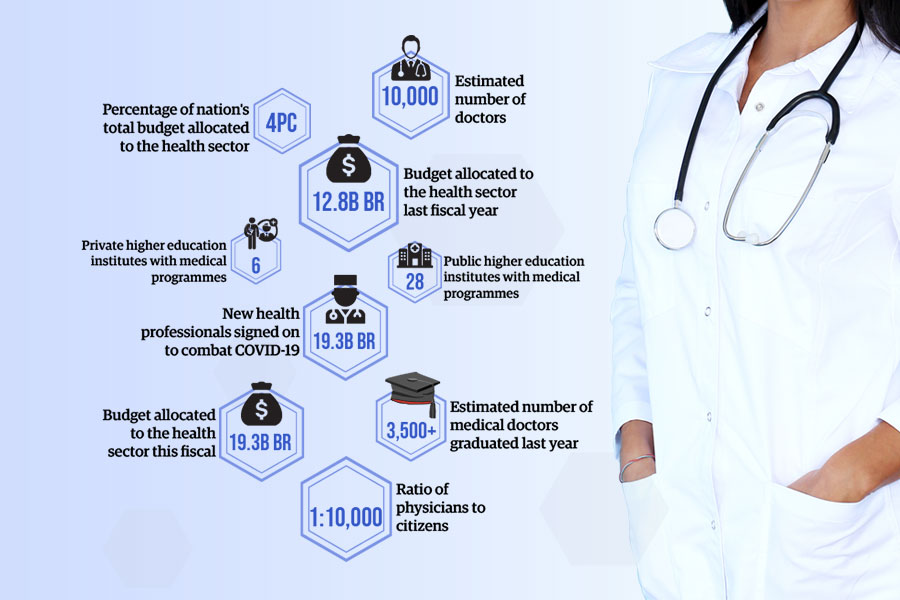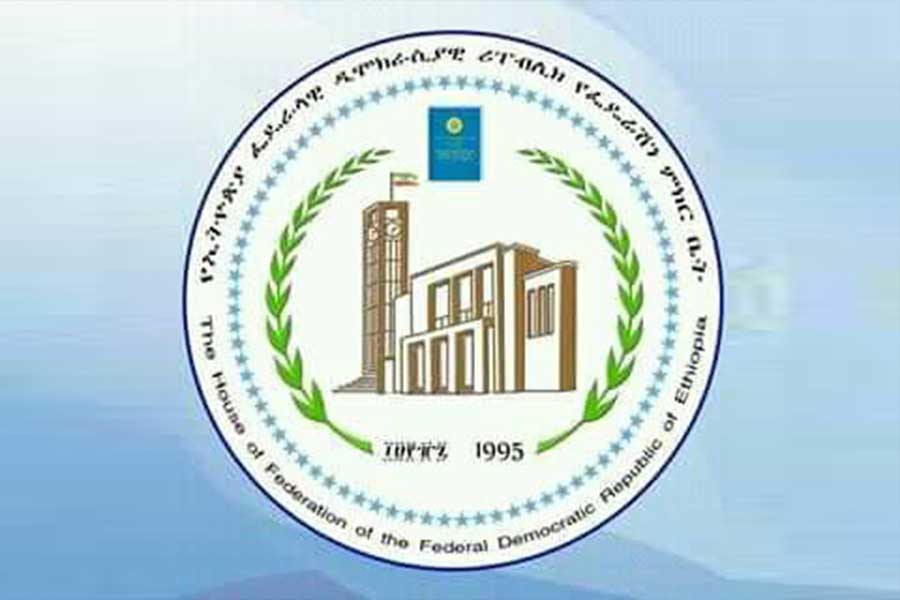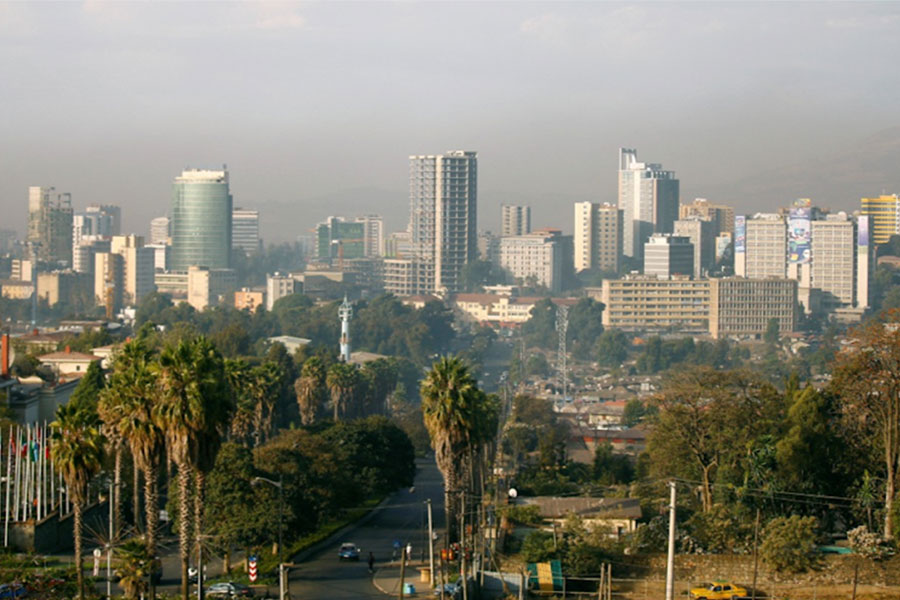
Representatives of businesses and traders in Tigray Regional State are calling for loan repayment extensions and interest write-offs totalling 60 billion Br, after a devastating two-year conflict that has seen their debts double due to accumulated interest.
The loans, taken out from commercial banks, have ballooned as interest accrued while businesses were unable to operate during the war. In the aftermath, the private sector is wrestling with severe financial difficulties and unfulfilled promised benefits or special treatments.
A meeting held at the Inter Luxury Hotel, Tito St. saw members of the Ethiopian Chamber of Commerce & Sectoral Associations and high-ranking officials, including Deputy Prime Minister Temesgen Tiruneh and Minister of Trade & Regional Integration Kassahun Goffe, discuss the pressing financial woes faced by the business community.
Berihun Haftu, president of the Tigray Chamber, underlined the struggles of businesses to recover due to unextended loans and unpaid interest.
“Business revival has been slow, if not non-existent; we need an immediate solution,” he urged the officials. He emphasised that many companies, already hit by severe property damage, are incapable of repaying loans.
During the war, 616 bank branches in Tigray were ordered to close by the central bank as looting escalated. Berihun questioned the rationale for demanding interest payments when banks were shut amid the conflict. He also noted the formation of a steering committee under the Prime Minister to address their concerns but lamented the lack of substantial progress.
“Nothing has changed,” he said.
The Chamber had appealed to the central bank to direct 18 banks and two microfinance institutions to write off interest on loans totalling 31 billion Br. The National Bank of Ethiopia (NBE) issued a directive last year, loosening loan repayment terms for businesses in the region to aid recovery.
Vice Governor Fikadu Digafe noted that central bank has encouraged commercial banks to grant easier credit access and reschedule existing loans to support the rehabilitation process.
“We've been doing what we could,” he said.
However, efforts to waive accumulated interest have stalled. Fikadu explained that a team under NBE’s supervision has been unable to gather sufficient information to proceed. “The study hasn't taken effect yet,” he noted, stressing that any decision on waiving interest would require a thorough assessment of how the debts would be absorbed.
Haftey Hagos, secretary-general of Tigray Chamber, pointed out that businesses have struggled to recover, hindered by issues such as the 14pc credit growth cap imposed by NBE and the absence of special provisions for regional recovery.
“The region needs to be treated differently to make any changes,” he told Fortune.
Business owners like Haleka Moges, general manager of Moges Negu Commercial Ranch Plc, have faced devastating losses. Established in 2006, the ranch suffered millions in damages during the war. Six months before the conflict, the company took out a 570-million-Br loan, which has now swelled to nearly one billion Birr due to accumulated interest. “We requested for the interest to be waived and the repayment period to be extended,” said Haleka.
The company’s attempts to restart operations have been thwarted by financial constraints, with a loan request of 2.5 billion Br still pending.
According to NBE’s recent Financial Stability Report, Ethiopia’s banks have issued nearly two trillion Birr in loans as of June 2023, with a non-performing loan (NPL) ratio of 3.6pc, below the regulatory threshold of five percent. Commercial banks are tightening risk management policies due to high NPL rates in Tigray.
A panel discussion three weeks ago, featuring representatives from the Development Bank of Ethiopia (DBE) and the private sector, underscored the concerns of Tigray investors. While investors sought special consideration, DBE President Yohannes Ayalew noted that waiving interest is beyond their capacity, suggesting government intervention is necessary to revive businesses in northern Ethiopia.
Wegagen Bank, which operates a considerable number of branches in Tigray, has resumed operations post-conflict, reopening 112 branches that were shuttered during the war. Deputy CEO of Operations Kidane G. Selassie said that even during the conflict, the bank proposed special loan terms for the region. Following the central bank’s directive, Wegagen rescheduled loans, reduced interest by 25pc after risk assessments, and extended repayment periods without accruing new interest.
“We did the best of our ability to help the businesses,” he said.
He also stressed that fully waiving interests could pose a significant risk to the bank's financial stability and shareholder interests.
“That would be an impossible task,” he told Fortune.
Experts caution that waiving interest payments entirely would expose banks to financial instability. Eshetu Fantaye, a financial consultant, argued that banks cannot afford to forgo interest due to high deposit costs and mandatory treasury bill purchases from NBE.
“They can't afford to waive interest,” he said. "They'll face a huge capital crunch."
He suggested a more sustainable approach, involving government support to share the financial burden with banks while preserving their capital.
“The sustainability of their capital is crucial,” Eshetu said, advocating for prudent measures to balance the needs of businesses and banks in the region.
PUBLISHED ON
Sep 01,2024 [ VOL
25 , NO
1270]

Radar | Apr 24,2023

Radar | Jan 16,2024

Radar | Dec 11,2021

Fortune News | Dec 05,2020

Fortune News | Aug 18,2024

Fortune News | Oct 31,2020

Fortune News | Oct 11,2020

Radar | Apr 13,2025

Radar | Jan 09,2021

Radar | Apr 03,2021

Dec 22 , 2024 . By TIZITA SHEWAFERAW
Charged with transforming colossal state-owned enterprises into modern and competitiv...

Aug 18 , 2024 . By AKSAH ITALO
Although predictable Yonas Zerihun's job in the ride-hailing service is not immune to...

Jul 28 , 2024 . By TIZITA SHEWAFERAW
Unhabitual, perhaps too many, Samuel Gebreyohannes, 38, used to occasionally enjoy a couple of beers at breakfast. However, he recently swit...

Jul 13 , 2024 . By AKSAH ITALO
Investors who rely on tractors, trucks, and field vehicles for commuting, transporting commodities, and f...

Jul 12 , 2025
Political leaders and their policy advisors often promise great leaps forward, yet th...

Jul 5 , 2025
Six years ago, Ethiopia was the darling of international liberal commentators. A year...

Jun 28 , 2025
Meseret Damtie, the assertive auditor general, has never been shy about naming names...

Jun 21 , 2025
A well-worn adage says, “Budget is not destiny, but it is direction.” Examining t...